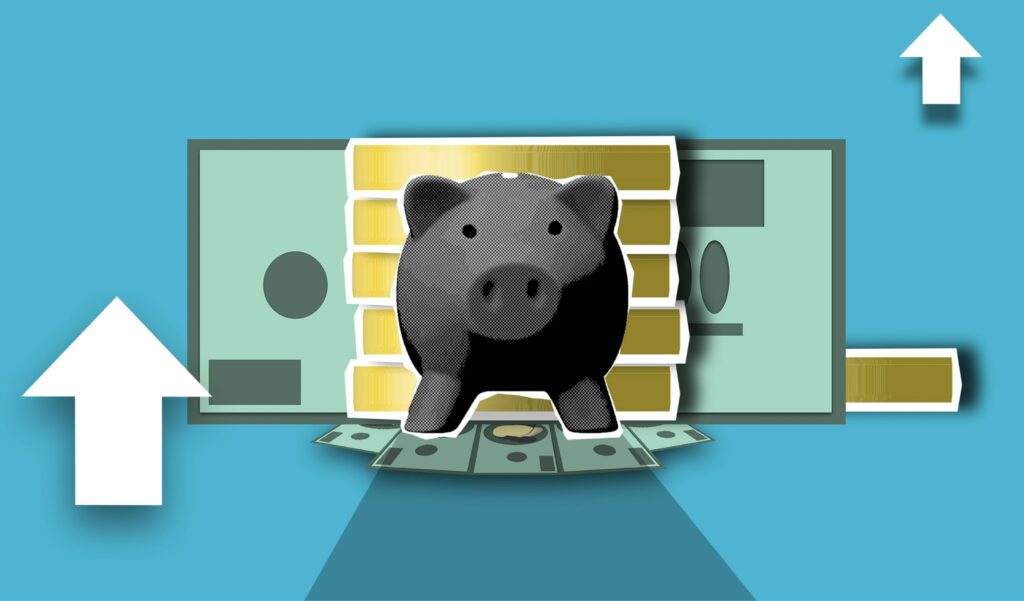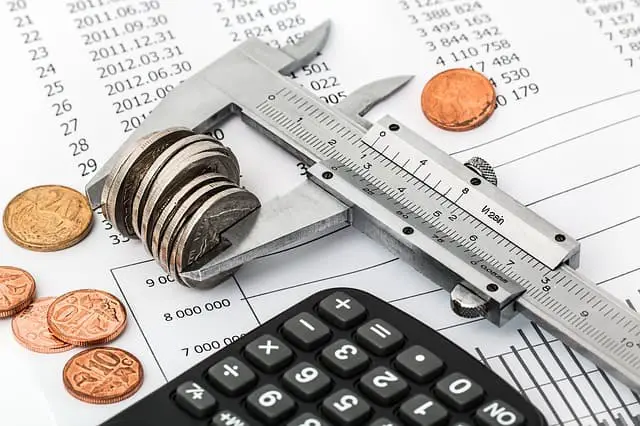The month of April will end in just a few days, and before you know it, the second quarter of 2021 has passed in a blink of an eye.
Have you made progress in your savings/budgeting/spending plan (whatever you call it) yet? How about your money savings challenge? Are you making peace with your shifting money mindset?
On the other hand, if you're on your way to your target money goal, good for you! We here at TheFinanceBoost couldn't be more proud.
And for those on the other end of the line, don't worry.
As C.S. Lewis once said, “You are never too old to set another goal or to dream a new dream.”
This quarter, learn how to save 3000 dollars in 3 months even if you're plain broke. Dude, we got you!
Think it's impossible? this article will prove how to save 3000 in 3 months. (Yep you're reading it right).
Therefore, without further ado, let's dive in!
The Ancient Savings Formula

If you're living paycheck to paycheck, every dollar counts. On the outside, it may seem as if you're literally barely getting by, and every cash is stretched.
Plus, you might be hanging on a tight budget, working 24/7 and 365 to make ends meet. But your take-home pay is still not enough.
So how do you deal with it? The answer is straightforward. You had to build a saving!
YES! You must set aside money every paycheck to put it towards your emergency fund, college fund, travel fund, or whatever purpose you're saving money with.
A safety net of three to six months worth of monthly expenses can help you meet your needs and wants during the time when you're looking and transitioning for a new job or recovering from an accident, etc.
Of course, we all have different lifestyles and current living situations. But, the most important thing you should remember is to always keep a portion of your money for savings.
If you're a budgeting virgin, well, it wouldn't be long until you find out free resources online, such as blogs like TheFinanceBoost, as well as available budgeting templates and excel sheets to aid you in your budgeting/savings journey.
I guarantee you, it's fun! Isn't it nice tracking every single cents and dime, giving you a clear picture of how well you handle your money? If the result is not entirely to your expectation, dude, face the harsh, ugly truth.
Furthermore, there is a secret you should know. Let's call it, The Savings Formula.
It's not a complicated type of formula you had encountered in algebra class or calculus. No, it's nothing like that.
Similarly, there's an ancient savings formula that you may have known for awhile now. It goes like this.
INCOME – EXPENSES = SAVINGS.
In other words, “Just have some money left over every month,”
However, do you see the problem in this formula? Aside from the fact that it's outdated, we always emphasized PAY YOURSELF FIRST and TREAT YOUR SAVINGS LIKE AN EXPENSE.
Sure, you can still save a little higher or lower amount from this formula, and over time, it adds up.
But what if the final answer to the equation is a negative balance? Where will you pull your supposed savings?
Let's modify this old savings formula.
The New and Modified Savings Formula

The Modern Savings Formula you should know right now is as simple as: (Please tattoo this in your head and memorize with all your heart).
DECREASING EXPENSES + INCREASING INCOME = SAVINGS
Looks too hard? Here's how it's such a piece of cake!
To clarify, decreasing expenses means you cut down on your costs. These are frivolous and commonly unnecessary expenses you spend your money on. Stretch every dollar! Hence, budgeting is critical here (more on this later).
On the other hand, increasing Income is all about accelerating your cash flow. Ever heard of the word side-hustles and gig economy?
Remember, having 9-5 is not the problem. Instead, ask yourself: “Is my 9-5 bringing me my desired income?”
And, if the answer is not, how do you fix that?
Here's food for thought: Relying on a 9-5 income alone is not enough anymore. But, it also doesn't mean you should quit your day job, NO!
What you really need is to increase your spending power by increasing your income. How?
For example, you can:
- Learn a skill
- Use it as leverage for a better paying job or
- Take your chances in the free market and freelance on the side
- Pick up a ton of side-hustles or start your own business.
See? Now that's not too difficult, isn't it? With this formula in mind, you can have even a higher disposable income to contribute to your fun money or spend on whatever you like.
Let's break it down.
How to save 3000 in 3 months if you're struggling to make ends meet? Let's break it down for a microscopic view.
How to save 3000 in 3 months
$3000 in 3 months will break down to $1000 per month. If you divide it by week, that is $250. Better and doable, right?
So how do you do that? First of all, you can cut back on your costs and look for a lucrative side-hustle and take some part-time jobs during your free time.
You may also work overtime if you can't leave your job and then ask for a raise if you think you deserve it and did a job well done.
There are so many things you can do. For instance, you can read more related articles below.
Further reading:
- How to Save Money Every Month- 9 Simple Steps to Start Saving
- How to Save $1000 Fast- The ABC of Ultimate Savings Goals
- 32 Realistic Ways to Save Money Very Easily Without Giving Up Too Much
Save $3,000 in 6 Months
In this scenario, since we have now extended our timeline into six months, it would make our saving goal more likely reasonable and doable, of course.
If you give yourself six months to reach your savings goal, that means you only have to save $500 per month or roughly $125 per week.
To succeed in this goal, you must track expenses and budget still. Other than that, maximizing your income capacity is still a viable option.
Perhaps you can start working from home and become a freelancer? Tap into your known skills and earn money from things you already know what to do.
Keep in mind that you don’t have to save it all in equal increments. Maybe you can save say, $50 this week and then $32 next week. But you pull in $250 helping finished tasks and several odd jobs the following weekend.
That’s totally OK. Just keep plugging along; small amounts add up!
Save $3,000 in 12 Months
Now this goal is the easiest to attain compared to mentioned breakdowns above. Let’s see some different ways to slice this cake:
$3000 in 12 months is:
- $250 per month
- $58 per week
- $8.22 per day
If you see it this way, it wouldn't be too overwhelming, right?
To win this goal, here are some cool saving techniques you can do:
- Make a budget or spending plan
- Bring your own lunch to work
- Use grocery coupons
- Brew your own coffee
Nonetheless, no matter how you want to revive your saving goal, the key is consistency and motivation. To do that, you need financial discipline and gain valuable financial knowledge.
Steps on how to save 3000 in 3 months
To work your way up to your $3000 in 3 months goal, here are a few steps you can take. It's not a smooth ride out there but I promise it will be all worth it!
Step #1: Get all your finances in order.

About 38% of Americans have not created a personal budget in at least 10 years or have never created one. Isn't it obvious? The very first step is to build your financial game plan. You can do this by starting to make a budget and track every last drop of money.
Make sure you have a hard copy or at least access to your SOA or statement of account, know every maintaining balance and current balance you have in your bank account, and consolidate it in one single pile. (Spreadsheet junkie, anyone?)
It will be easier to establish a financial game plan if every aspect of your financial matters and affairs are laid out in front of you. As a result, you will clearly see whether you are overspending on specific categories you shouldn't neglect.
In this first step, it is also crucial that you define your goals. Moreover, use the SMART method. Keep in mind that NO GOAL = NO DRIVE = NO PLAN = ZERO OR MEDIOCRE SAVINGS. Man up, dude! Let's get serious and get more interested since it is our finances we're tackling here; your money and your life!
Consequently, collect all those receipts, ready your pen and paper (if that's your thing), review your spending habits, and list any possible spending you have. Clarify your needs vs. wants, in other words, negotiables and non-negotiables.
Remember, a goal without a plan is just a mere wish. We are not wishful thinking here, aren't we?
Step #2: Shrink or Cut unnecessary costs.

Now that you have a budget that will work as an eye-opener to you and have assessed every ins and outs of your cash flow, it's now time to reduce or cut those non-necessities.
But how do you know which is your absolute needs vs. not? And most importantly, how do you make up for these crash costs?
Well, first of all, it will be a call of judgment, and you have to thank your budget because that same budget will tell you exactly about which categories to reduce spending with or totally cut out.
Furthermore, you should be realistic about it. Only say YES to absolute essentials like food, utilities, mortgage, etc. Luxury brand item? Expensive manicure and pedicure treatment? Think again!
Aside from that, don't let hidden charges eat your money (we'll talk more about this later.) As a result, carefully decide whether you want to sink or swim through your budget.
Here are a few points.
| Gym membership | That $30 gym membership will be deemed useless if you only visit the gym once a month. Why not try some indoor workout instead? |
| Subscriptions | Nowadays, we tend to “subscribe” to many things. Have you taken the time to check whether those monthly box subscriptions are all worth it? You can also try cost-trimming apps that will track unused subscriptions for you. |
| Utilities | To save money on utilities, you can use energy-saving appliances and of course, switch them off when not in use. You can also lower your cost by taking short showers and make sure to fix any leaky faucets. |
| Eating out | Bring your own lunch or meal at work and plan it ahead of time. For instance, make use of what's in your current inventory pantry and plan your meal around it. Choose the right location to shop your groceries and use the good old coupons. |
| Coffee | The average cup of coffee is $5 and if you’re going for fancier stuff it can average to about $8 a cup. Instead of letting your love for coffee bust your budget, you can buy a whole jar of instant coffee for anywhere from $0.90 to $5, and it will last you the entire month, if not the next 2-3 months. You can also learn to brew your own coffee at home and try trendy Dalgona Coffee circulating Pinterest. |
| Cable TV | Cut the cable! The internet is free; why not utilize it? You can save money by ending those subscriptions and instead stream movies and TV shows online. |
| Books | If you have a weakness for books, you’ll know how expensive some of them can be. But reading shouldn't be a costly hobby! You can try renting books on Amazon or downloading a free ebook version of them. Moreover, you can check your local library and read available free books! So pump your library card now! |
| Shopping | Did you know that you can also save money from shopping? For starters, you can use cashback apps to save a tiny amount from your shopping spree. Try online shopping too; it's convenient and more likely has great deals around. |
Therefore, let go of all that petty excuses and start saving now! That is to say, there's no reason why you shouldn't and can't start today. You can do one or combine both options: Reduce or Cut unwanted expenses!
Step #3: Increase your cash flow.

The sad life reality is that not all jobs are equal, likewise wages. If you would like to know how to save 3000 in 3 months when you don't make nearly enough of that amount to do that, you have to level up your income.
There's two way to do it.
- You can start a side-hustle or
- Make money doing what you already know or have
Start a side-hustle.
Nowadays, there is no shortage of lucrative side-hustle available online or offline. All you have to do is find your spare time and commit to it. Here's a bunch of side hustles you can do part-time or full-time.
- Pet sitting at Rover
- Food delivery on UberEats, Grubhub, and Postmates
- Teach online
- Become a virtual friend
Make money doing what you already know or have.
- Sell refurbished electronics and gadgets through Decluttr.
- Sign-up to Mercari and sell your stuff
- Rent your extra room on Airbnb
- List your stuff on Facebook groups, eBay, or Craiglist.
- Sell your skills and work as a freelancer.
Step #4: Use the right tools.

How to save 3000 in 3 months you may ask? Use the right tools!
You don't want to mix up your savings with your spending money or forget to save $8.22 per day or $58 per week.
Therefore, you must use a saving app to deduct the money from your account at regular intervals.
Besides that, you must also have a separate account for your side-hustle income and try not to touch it. You know the classic catchphrase: diversify your money!
Don't forget to put it in an auto-pilot mode so that you won't forget that you have to set aside money every week or daily. That's like the ultimate cheat code to save more money!
Consider also those annoying gray charges and financial leaks that may potentially hurt your money. Take advantage of online or mobile banking to reduce bank fees and other expenses. Avoid those late payments and bank hidden charges at all costs!
Read more: Qapital Review: How this Money App Helped Me Save $7000+ in 7 Months.
Step #5: Reward yourself.

Finally, although I emphasized gravely to take this saving process very seriously, don't forget to incorporate at least a bit of sunshine into it.
Reward yourself with some funds for fun and enjoyment. That way, budgeting, and saving won't feel like torture. The battle here is consistency and resistance. Giving up is the least you can do!
Take a vacation, treat yourself to a nice dinner sometimes, but do these within reason and with a plan. Treat yourself after you reached your $3000 savings goal! You deserve it!
Furthermore, our human brains love rewards and hate abstinence. If you try to link your goal to short-term wins, you will most likely look forward to having something to celebrate quicker, and boy was it fun!
So why use your brain's weakness as a tool to reach your goals when you can play on its strengths? You tend to work harder for things that reward you the most. So set yourself up to win from the start!
Final thoughts
Yey! Finally, we have a concrete financial game plan on how to save 3000 in 3 months. Certainly, I strongly recommend picking up step #2 and, most significantly, step #3. We shouldn't rely on one income alone; always aim to boost our income.
In short, you can combine both steps and leverage them to your advantage.
Besides, income is not equal to wealth. Income can be high and still insufficient while wealth is income done right.
If you've never used budgeting before this might be a challenge, and you will feel like these numbers don't speak to you, but remember, little by little, bit by bit, it will all add up and great things start from small humble beginnings.
To sum up, a milestone starts with a single step. Certainly, no matter how different our actions are, small or big, you will reach your destination if you are moving. Above all, enjoy the journey or the process aside from focusing solely on the end game.
You know you should be saving, investing, and taking better control of your finances, you are financially literate, and you've read a lot about what to do but you don't do them.
This time, what are you waiting for? Go ahead and earn your first $3000! I am rooting for you!
If you have any ideas on how to save more money, share it with us below! We love to hear from you!










0 Comments